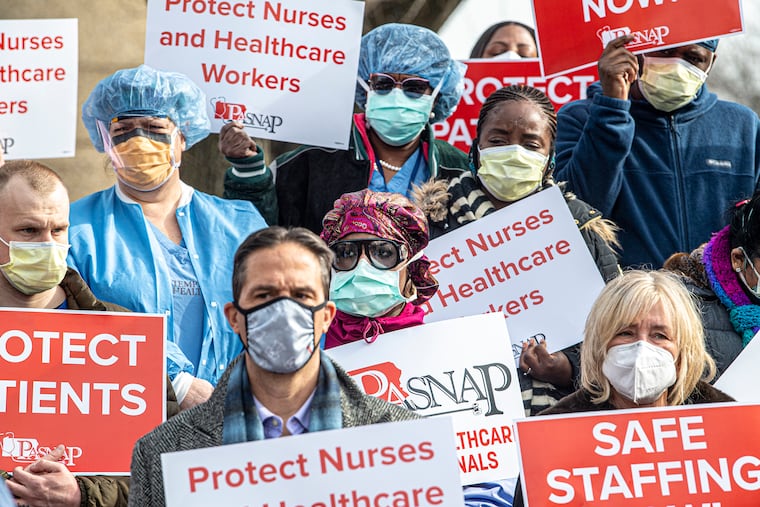Temple hospital workers sign contract, avert strike
The new contract increases wages, reduces mandatory overtime, and includes protections against workplace violence.

Temple University Hospital and its nurses and technical staff agreed on a new contract Monday that makes the nurses the highest paid in Pennsylvania and avoids a strike by more than 2,000 workers, according to union officials.
The three-year contract passed Monday night with 88% of voting nurses and 89% of votes cast by technicians and professionals, such as X-ray and lab technicians. The contract retroactively went into effect Oct. 1.
The contract resolution negotiated by Temple Allied Professionals and Temple University Hospital Nurses Association comes less than a month after workers authorized the unions to send hospital administration a strike notice, which would have been a precursor to a strike.
Temple spokesperson Jeremy Walter described the contract as “fair and equitable for all parties” and said it will result in stronger recruitment and staff retention.
The contract features a pay increase that makes Temple’s nurses the highest paid in the state, the union reported, with the highest pay scales in any union contract in Pennsylvania.
The agreement includes staffing guidelines that improve nurse-to-patient ratios and reduce requirements for overtime. The contract also contains clauses designed to address workplace violence, such as placing weapons detectors and security at every hospital entrance, and a review process for incidents of workplace violence, thefts, and vandalism.
“This fight — and at times it was a fight — was always about our community: our TUH caregiver community and our patient community,” said ICU nurse Mary Adamson, president of the Temple University Hospital Nurses Association, in a statement.
The contract replaced one that expired Sept. 30.
The pandemic was especially hard on Temple Hospital, which received so many patients they had to be treated in spare surgery units, a gymnasium, and a converted outpatient pavilion. Nurses described staggering under the burden, and the resulting burnout, retirement, and career changes have increased the workload for the staff who remained.
“I’ve had to make too many impossible decisions,” registered nurse Janet Eaton said in the union’s statement. “I’ve had to decide between cleaning up a patient who had soiled himself and caring for an ER patient who had just come to the floor with a hemoglobin of 5, simply because we didn’t have enough nurses to provide both patients with immediate care.”
» READ MORE: Violence against health-care workers was rising. Then the pandemic hit, and made things worse.
Concerns about workplace violence grew after a Jefferson University Hospital nursing assistant was fatally shot at work in 2021.
Health-care providers are among the most likely in the nation to be victims of workplace violence, according to the Occupational Safety and Health Administration. The agency reported that from 2002 to 2013, incidents requiring an injured person to miss work to recover were four times more likely in health-care settings than the average of other private industries.
The Philadelphia Inquirer is one of more than 20 news organizations producing Broke in Philly, a collaborative reporting project on solutions to poverty and the city’s push toward economic justice. See all of our reporting at brokeinphilly.org.